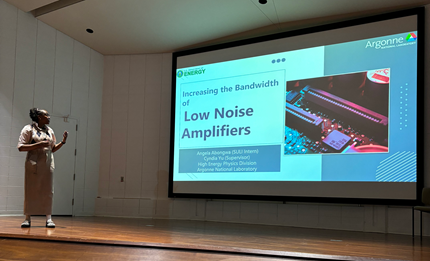Angela Abongwa - SULI

 Inspiration From a Superhero
Inspiration From a Superhero
University of Chicago student spends summer working at Argonne National Laboratory; it all began with The Flash
By Allan Brettman
Inspiration can come from anywhere, especially from superheroes.
Take Francisco Baracus Ramon, for example, better known as “Cisco" in The CW television series, The Flash.
Quite a guy, Cisco. His character is variously described online as a mechanical engineering genius, clairvoyant, and possessing dimension-traveling powers as well as the ability to deliver sonic wave vibrational blasts.
The makings of a scientist, in other words. That’s the way Angela Abongwa saw it.
“Cisco was a sidekick to the Flash, but Cisco really was a genius,” said Abongwa, who was 12 when she was introduced to the storyline. “The show talked a lot about physics properties. It’s a TV show, so of course some of it is exaggerated. But that was the first time I heard something about an accelerator and what it does.
“So yeah, I think that's where my love for science started was with The Flash. It had all these cool properties of science and the unknown and uncertainty. I thought it was interesting that there's a field out there, specifically quantum physics, that is very still unknown.”
Finding a lab home in her backyard
The inspiration appears to have been an accelerator for Abongwa. She is entering her senior year at The University of Chicago, where she is a physics major with an expanding interest in quantum science. Creating her own twist of fate, Abongwa spent summer 2024 as an intern at Argonne National Laboratory in Illinois, about 25 miles west of the university.
Abongwa obtained her 10-week Argonne internship through the Science Undergraduate Laboratory Internships (SULI) program. The program is one of the core programs overseen by the Department of Energy’s Office of Workforce Development for Teachers and Scientists (WDTS).
Abongwa focused her internship search on Argonne in part because of the working relationship between the laboratory and the University of Chicago. But Abongwa also credits First Look@Argonne, a WDTS-funded annual event that invites Chicago-area students to explore the laboratory’s facilities and meet Argonne staff members.
“I highly encourage any student in the Chicago area to look into this opportunity,” Abongwa said. “You get to learn about Argonne and its mission. They talk about the SULI program and other internship programs. So, there were a lot of opportunities to get involved with Argonne that I learned about at this event.”
A research project matched to her interests

Abongwa’s internship project at Argonne tapped into her quantum interests and the fact that she is a physics major. She worked with a kinetic inductance parametric amplifier, a device that uses thin films with high kinetic inductance to enhance quantum signals.
“I looked at ways to increase the bandwidth of this device,” she said. “Increasing the bandwidth means that we can increase the range that this amplifier can amplify signals.”
Abongwa earned a first-place award in the WDTS “Ignite Off Competition” among other SULI national laboratory interns for a five-minute PowerPoint presentation on her Argonne project.
Abongwa worked closely with physicist Cyndia Yu, an Argonne Scholar and a Kavli Institute for Cosmological Physics Fellow at the University of Chicago.
“Angela is exemplary at working to develop a complete picture of concepts in her head,” said Yu. “Beyond the simulation, modeling, and laboratory skills she developed, I am especially proud of her commitment to communication as a core component of a scientist's portfolio.”
Fermilab offered the laboratory introduction
The Argonne internship was the second for Abongwa at a Department of Energy national laboratory. In summer 2023, she participated in the Quantum Computing Internship for Physics Undergraduates Program at Fermi National Accelerator Laboratory (Fermilab), located about 40 miles west of Chicago. The three-week program is aimed at students majoring in physics and who are interested in quantum computing for the simulation of physics.
Abongwa said the Fermilab experience helped her narrow her career goals in quantum science. And in return, Abongwa displayed the skills that bode well for her career path, said Fermilab associate scientist Henry Lamm, a theoretical high-energy physicist.
“During her time here at Fermilab, Angela was a fount of curiosity for quantum information science equaled only by her drive,” said Lamm. “This new field requires comfort with both theoretical physics and experimental hardware, which Angela has a knack for. I encouraged her to apply for a SULI internship, as the national laboratories are where passionate students like Angela can explore all facets of the science that interest them.”
SULI helped shape plans for the future
Abongwa said her national laboratory internships have been a great way to gain hands-on experience. “It’s been insightful learning, seeing real-life applications of topics I learned in my courses,” she said. “I am also grateful to gain skills that are transferable to many graduate and industry research projects. The Argonne campus is also filled with students with diverse interests and it’s inspiring to hear about the cool projects they are working on.”
Following graduation from the University of Chicago, Abongwa said she will apply to graduate school and pursue a PhD in physics. But her internship at Argonne opened her thinking to other career paths she hadn’t considered before.
“The SULI experience definitely helped me a lot,” she said. “I was able to do research—and just research—for 10 weeks, and not have other commitments. The SULI program convinced me that research is something I want to pursue even more. SULI helped me understand that I want to focus more on research and being able to contribute to physics.”


